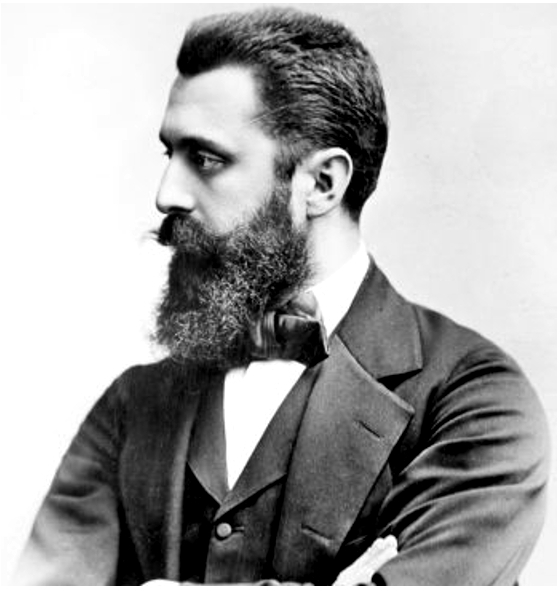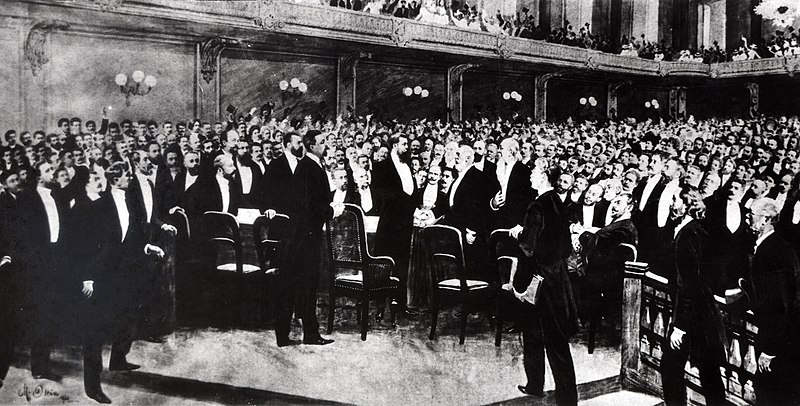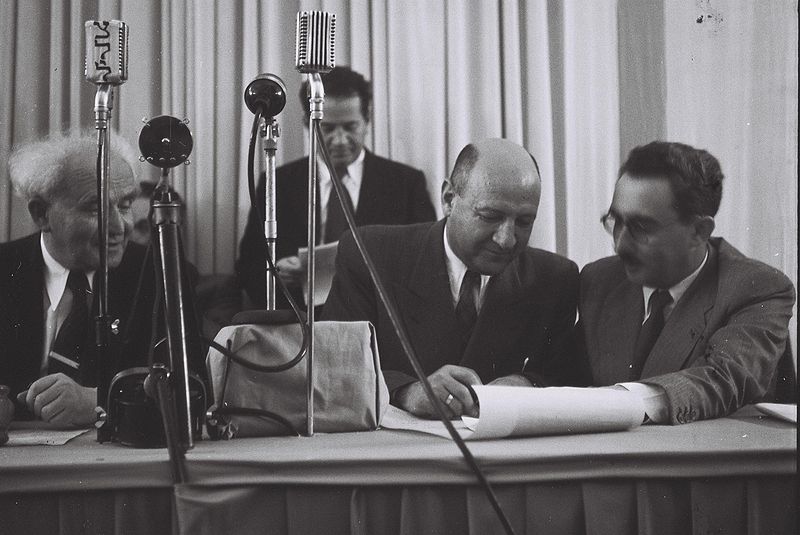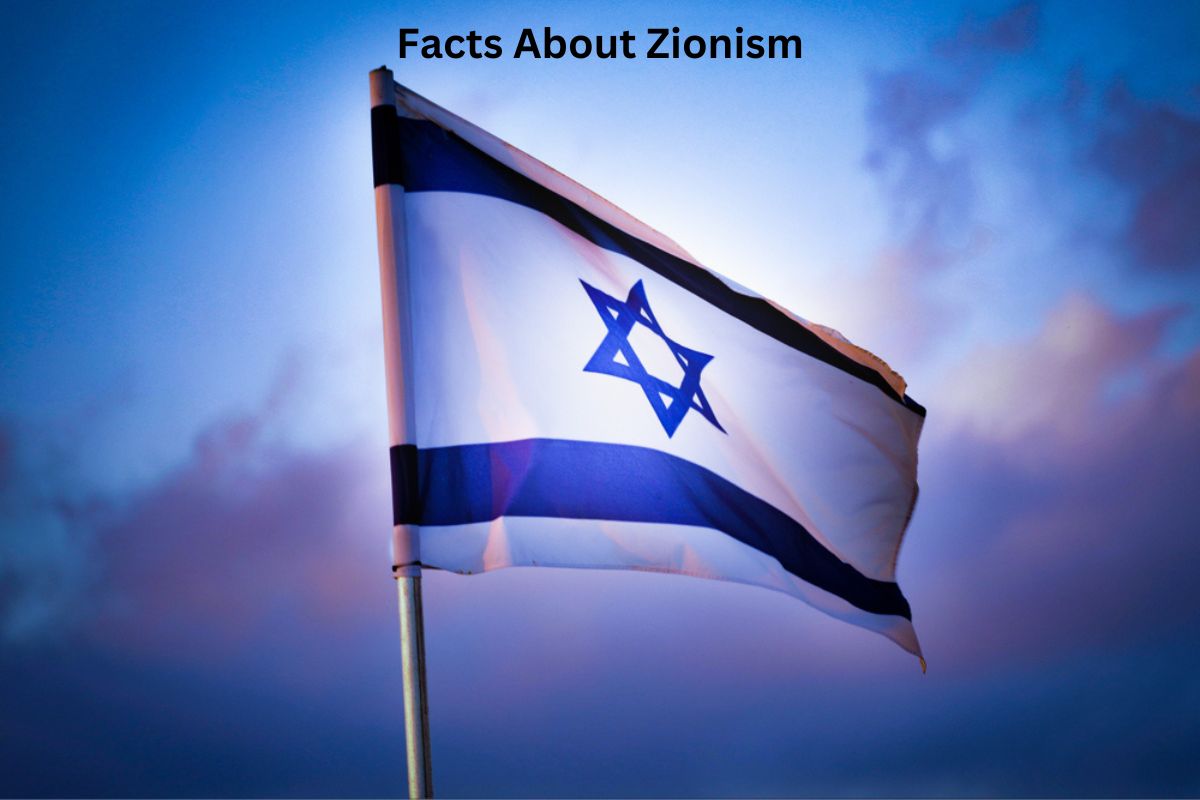Zionism is a multifaceted political and ideological movement that emerged in the late 19th century with the aim of establishing a Jewish homeland in Palestine.
It encompasses a rich and complex history marked by key figures, significant events, and diverse political ideologies. This movement eventually culminated in the establishment of the State of Israel in 1948.
To understand Zionism, one must delve into its historical roots, the impact of the Holocaust, the Israeli-Palestinian conflict, and its enduring influence on contemporary Israeli society and politics.
Zionism Facts
1. Originated from the desire for a Jewish homeland
Zionism emerged in the late 19th century as a response to the perceived need for a secure homeland for the Jewish people. It was a response to centuries of persecution, discrimination, and violence against Jews in various parts of the world.
Also Read: Timeline of Jewish History
The idea of returning to the historical Jewish homeland in the region of Palestine, which had deep religious and cultural significance for Jews, was at the core of this movement.
The concept of a Jewish homeland offered the prospect of safety, self-determination, and the ability to preserve Jewish identity and culture.
2. Theodor Herzl is considered the father of political Zionism

Theodor Herzl, an Austrian journalist and playwright, is widely recognized as the founder of political Zionism. His book “The Jewish State,” published in 1896, outlined the case for the establishment of a Jewish state in Palestine.
Herzl’s advocacy for a political solution to the “Jewish Question” gained widespread attention and support within Jewish communities and beyond.
He organized the first World Zionist Congress in 1897, which marked the beginning of organized political Zionism as a movement with the aim of achieving Jewish self-determination.
3. The first World Zionist Congress was held in 1897
The first World Zionist Congress took place in Basel, Switzerland, from August 29 to August 31, 1897. It was convened by Theodor Herzl and attended by approximately 200 delegates from various Jewish organizations and communities.
Also Read: Facts About the Western Wall
At the Congress, Herzl presented his vision for a Jewish state, and participants discussed and debated the goals and strategies of the Zionist movement.

The Congress established the World Zionist Organization (WZO), which became a central coordinating body for Zionist activities, including efforts to promote Jewish immigration to Palestine and raise funds for the establishment of a Jewish homeland.
4. The Balfour Declaration in 1917 expressed British support for a Jewish homeland
The Balfour Declaration was a letter issued by Arthur Balfour, the British Foreign Secretary, to Lord Rothschild, a prominent British Zionist leader, on November 2, 1917.
In the letter, Balfour stated that the British government viewed with favor the establishment of “a national home for the Jewish people” in Palestine.
The declaration was a significant development because it represented official British support for the Zionist cause. It was issued during World War I, when Britain was in control of Palestine, which was then part of the Ottoman Empire.
The Balfour Declaration had far-reaching consequences and is often seen as a catalyst for increased Jewish immigration to Palestine.
5. The British Mandate administered Palestine after World War I
After World War I, the League of Nations granted Britain the mandate to govern Palestine, which included the territories of present-day Israel, the West Bank, and Gaza Strip.
During the period of the British Mandate (1920-1948), tensions escalated between Jewish immigrants and the Arab population in Palestine. The conflicting national aspirations of Jews and Arabs contributed to ongoing unrest and conflict.
The British Mandate era saw increased Jewish immigration to Palestine, which was facilitated by various Zionist organizations. This immigration played a central role in shaping the demographics of the region.
6. The Jewish Agency played a key role in Jewish immigration to Palestine

The Jewish Agency for Israel, established in 1929, was a quasi-governmental organization responsible for coordinating and promoting Jewish immigration (Aliyah) to Palestine.
It was jointly run by the World Zionist Organization and Jewish leaders from various countries. David Ben-Gurion, who would later become Israel’s first Prime Minister, served as its head.
The Jewish Agency facilitated the establishment of settlements, organized economic development, and supported the social and cultural integration of Jewish immigrants into Palestine. It played a vital role in realizing Zionist goals.
7. The Holocaust emphasized the need for a Jewish homeland
The Holocaust, which occurred during World War II, was a genocide in which approximately six million Jews were systematically murdered by Nazi Germany and its collaborators.
The Holocaust had a profound and devastating impact on the Jewish people, highlighting the urgency of establishing a secure Jewish homeland where Jews could live free from persecution.
The horrific scale of the Holocaust galvanized international sympathy and support for the Zionist movement’s goals, including the establishment of a Jewish state.
8. The United Nations approved a partition plan for Palestine in 1947
In 1947, the United Nations adopted Resolution 181 (also known as the UN Partition Plan for Palestine), which called for the partition of Palestine into separate Jewish and Arab states, with Jerusalem under international administration.
The plan was a response to the ongoing conflict between Jewish immigrants and the Arab population in Palestine and aimed to provide a peaceful solution to the crisis.
While the Jewish leadership accepted the partition plan, Arab leaders rejected it, leading to the Arab-Israeli War of 1948.

9. Israel declared independence on May 14, 1948
On May 14, 1948, David Ben-Gurion, Israel’s first Prime Minister, declared the establishment of the State of Israel, just hours before the British Mandate over Palestine was set to expire.
The declaration of independence marked a significant milestone in the Zionist movement’s quest for a Jewish homeland.
The establishment of Israel led to a war with neighboring Arab states, as they opposed the creation of a Jewish state in the region.
10. “Aliyah” refers to Jewish immigration to Israel
The term “Aliyah” is often used to describe the immigration of Jews to Israel. It comes from the Hebrew word “עֲלִיָּה,” which means “ascent” or “going up.”
Aliyah has been a central element of Zionist ideology, as it represents Jews returning to their ancestral homeland and fulfilling the Zionist dream of living in Israel.
There have been multiple waves of Aliyah throughout Israel’s history, with Jews from different parts of the world making the journey to settle in Israel and contribute to its development.
11. Zionism encompasses various political ideologies
Zionism encompasses a wide range of political ideologies and perspectives, reflecting the diversity of thought within the movement.
Some prominent streams of Zionist thought include:
- Secular Zionism: Emphasizes the establishment of a Jewish homeland based on secular principles, often focusing on national identity and cultural revival.
- Religious Zionism: Integrates religious beliefs with the Zionist ideology, viewing the return to the Land of Israel as a religious imperative.
- Socialist Zionism: Advocates for the creation of a socialist society in Israel, emphasizing communal ownership and social equality.
- Revisionist Zionism: Promotes a more assertive approach to achieving Zionist goals, including a strong military posture.
These differing ideologies have contributed to the diversity of political parties and movements within Israeli society and have shaped the country’s political landscape.
12. The Israeli-Palestinian conflict stems from Israel’s establishment

The establishment of the State of Israel in 1948 led to an ongoing and complex conflict with the Palestinian Arab population.
The Israeli-Palestinian conflict revolves around issues such as borders, refugees, the status of Jerusalem, and security concerns.
Various attempts at negotiations and peace agreements have been made over the years, but a comprehensive resolution has remained elusive, resulting in periodic outbreaks of violence.
13. Zionism remains a significant force in Israeli society and politics
Zionism remains a significant force in Israeli society and politics, as the concept of a Jewish homeland in Israel continues to be a core element of Israeli identity.
The State of Israel has evolved over time, developing into a modern, democratic, and technologically advanced nation.
Today, Israel faces both domestic and international challenges, including security concerns, economic development, and ongoing efforts to resolve the Israeli-Palestinian conflict.
The Zionist movement, while having achieved its central goal with the establishment of Israel, continues to influence Israeli policies and society.
